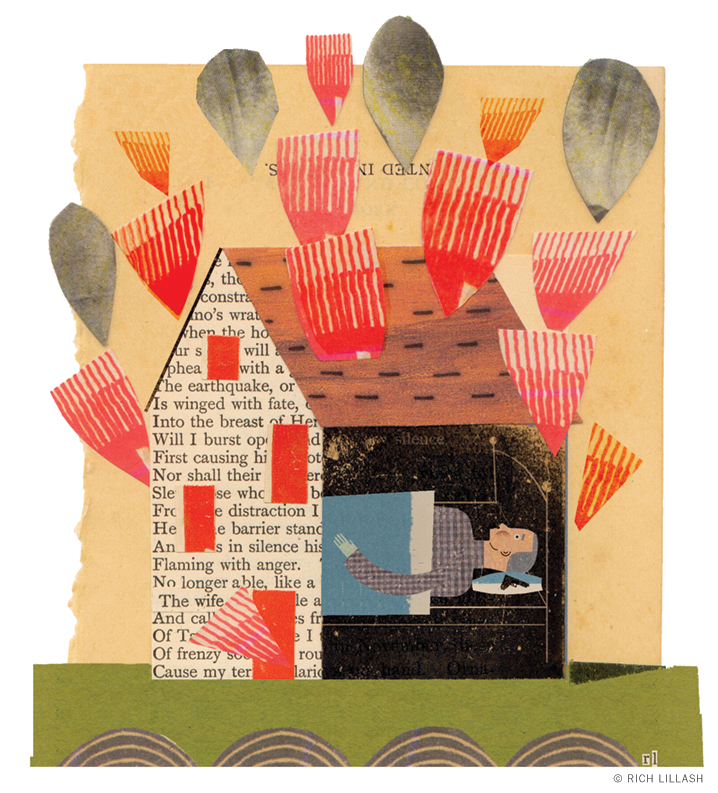
Notes on a skewering.
By Nick Lyons
Many years ago a dear old friend sent me a letter nasty enough to signal the end of a long and happy friendship. It was a sharp smack in the face—deliberate, unexpected, harsh, and meant to hurt. It did.
What had I done to deserve this? What dreadful unintended affront to him, what lack of respect, what rude comment on his latest novel? I had used the word “miffed” in an otherwise genial letter, expressing mild irritation that he had not visited an exhibition of my wife’s paintings.
My letter had mostly been devoted to asking about his writing, his wife’s health, his plans for the following week. But apparently my soft expression of disappointment canceled all else out.
I thought of our friendship, begun decades earlier when he had been a sound and inspiring professor of mine, and then a friend close enough for us to have spent long days together, stayed at each other’s houses, shared meals, vacationed together, laughed and argued frequently with warmth and affection. He was devilishly witty and smart, and I enjoyed our friendship immensely.
What should my response be? At first I considered an equally nasty reply. It could have been justified. I have a wolf in me—but I keep it on a short leash. Perhaps then I should offer a patient explanation of why I was miffed. But that would only have led to more venom, I feared. A quiet request for forgiveness, a simple apology—even though I could think of no crime I had committed? There’s some chance he would explain or even apologize, though in all our years I had never known him to do anything like that to other recipients of his anger and ire. In the end, I kept my peace. I remained silent.
A few months later, a mutual friend asked what I had done to Bill for him to say: “Never mention the name Nick Lyons to me again!”
My silence must have bitten him sorely. That became clear when he issued a new collection of writing that featured a story about me. The story was so cunning, ironic, and mean—especially to my wife, to whom I ordinarily told everything—that in the 25 years before she died, I never even hinted at its existence. Bill’s story was a pathetic tragedy—not very well managed, though who am I to say—about a dumb, sheeplike husband and his mediocre, pompous, and untalented wife: a crude portrait of horribly misspent love and utter unworthiness. The prose oozed the author’s delight in his own cleverness. And just to be sure that no one mistook his thinly veiled target for some other innocent lamb, he confided to his two biographers precisely of whom he had written.
It all made me think of other literature boiling with envy or moral superiority or just the urge to get even for any reason. There is a long tradition of literature that makes revenge its centerpiece. A dozen examples from the Iliad and other works from the Greek canon came to mind. Iago, of course. Alexander Pope’s “The Dunciad,” flaying Colley Cibber who had savaged him in print. Alfred Jarry’s dreadful little play, Ubu Roi: that weird exercise in how to bash your high school math teacher. William Kotzwinkle’s The Bear Went Over the Mountain, so severe a sendup of the book publishing world that a talented friend quit publishing forever because of how she had been depicted, becoming a social worker instead. Phillip Roth’s and Clare Bloom’s books, urinating publicly on each other. Or that delicious portrayal of revenge, The Count of Monte Cristo.
And after all these I remembered a brief but vivid moment when a business associate got up from our lunch table, walked across the restaurant, grabbed a gray-smocked waiter by the tie and forced him up to the wall, saying something I could not hear. I shook my head and asked what all that was about. I happened to know the waiter. He had been a promising young man: handsome, bright, athletically gifted, the sure image of someone with a strong future. He had been self-confident and perhaps a bit too bold. But now, in his 40s, he was waiting on tables. My lunch mate, it turned out, had known him briefly, and told me that he had delivered the following message as he mashed the fellow against the wall: Do you remember when we were in high school and you were a class higher and bullied me that afternoon? The confrontation had occurred a quarter of a century earlier.
“My idea of revenge,” Louise Glück wrote in one of her superb essays, “was to prove that I had not been hurt.”
Years later, a mutual friend expressed deep sympathy for the way I had been skewered in print. I told him I had long since stopped smarting, and now simply thought how sad it was for Bill to have such bile in his blood. I told him I had nearly forgotten the whole incident, which ultimately revealed more about him than me, and certainly my wife. Then I smiled, remembering Bill’s love of a Faulkner story called “Barn Burning,” and said lightly, as an afterthought, “Well, I may just have to burn his house down some day.”
I don’t know if there is or ever should be a best or even appropriate revenge, eye for eye. Louise Glück’s comment makes perfect sense, but it’s one half the equation. Isn’t there another person involved? I take no satisfaction whatsoever knowing that my old friend slept his miserable last days with a loaded pistol under his pillow. Was it against the appearance of his would-be arsonist? I feel only pity, only loss. Poor old friend, poor Bill. Poor Nick.
Nick Lyons W’53 has been a longtime contributor to the Gazette.

